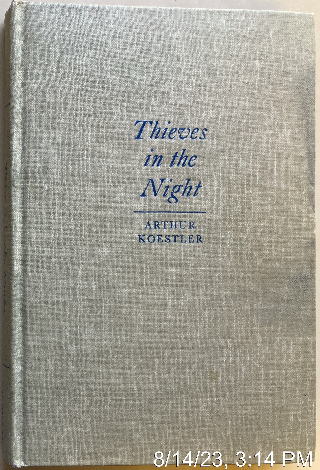-
Arthur Koestler, "Thieves in the Night"책 읽는 즐거움 2023. 11. 9. 11:22
.

Arthur Koestler, "Thieves in the Night" (1946)
뉴욕 타임즈 서평: Koestler's Novel of Zionism
유대인 작가 Arthur_Koestler 의 이 소설을, 1400명의 이스라엘 민간인을 학살한 10. 7 하마스 테러에 대한 이스라엘의 초기 대응이 그 서너 배의 팔레스타인 민간인 학살에 이르고 있던 그 무렵에 그냥 문득 생각이 나서 읽기 시작한 건데 마침 때 맞춰 잘 읽었다.
1937년 20대 초반의 청년들 25명이 안정된 한 키부츠(Commune)의 지원을 받으며 갈릴리 지역 한 언덕에 새로 세운 키부츠 Ezra's Tower가 새 구성원들을 받아들이며 2년 후에는 안정된 300명 규모로 성장해서 새로 시작하는 다른 키부츠를 지원하게 되는데, 그 동안에 Ezra's Tower의 초기 멤버 두 사람은 영국과 아랍인 대상의 테러리스트가 되어 키부츠를 떠나고 역시 초기 멤버인 Joseph은 그들 테러리스트 조직에의 가입을 비밀로 하고, 아랍인들과 좋게 지내려는, 키부츠에 그냥 남는다.
유대인 문화에 대해 갖게 되는, 막연할 수밖에 없는, 어떤 느낌과 생각이 이 소설에서나 평소, 예를 들어, 뉴욕타임즈를 읽으면서나 별로 다르지 않음을 느낀다. 다음은 Wikipedia, Arthur_Koestler 에서:
In December 1944 Koestler travelled to Palestine with accreditation from The Times. There he had a clandestine meeting with Menachem_Begin, the head of the Irgun paramilitary organisation, who was wanted by the British and had a 500-pound bounty on his head. Koestler tried to persuade him to abandon militant attacks and accept a two-state solution for Palestine, but failed. Many years later Koestler wrote in his memoirs: "When the meeting was over, I realised how naïve I had been to imagine that my arguments would have even the slightest influence." Staying in Palestine until August 1945, Koestler collected material for his next novel, Thieves_in_the_Night.
아래는 소설 본문에서:
Has it occured to you that there is no word in Hebrew for million? (p. 19)
"He explained that every nation has the right to live according to its own fashion, righr or wrong (...)."
"And what did you answer?"
"Nothing."
"But you saw his point?"
Bauman looked at him steadily:
"We cannot afford to see the other man's point." (p. 38)
Matthews let his eyes wander and take in the landscape from the height of the tower: all those arid and yet softly undulating hills, now ochre-coloured under the flaming sky; a silent landscape which bore the hallmark of eternity. (p. 48)
I wonder whether any other race has the same capacity for doctrinaire fanaticism as ours. It has, I suppose, to do with the Exile; émigrés always have cliques and quarrels, and we have been émigrés for two thousand years. The exiled have nothing to hang on to except doctrines and convictions; hence they fight over ideas like dogs over bones. The others call it politely our semitic intensity. (p. 91)
"Tell our guests," the Mukhtar said measuredly. "that we are not of those who always bewail their misfortunes in the ear of the world, as certain people do. We have no propaganda office in the capitals of Europe and no gold to buy newspapers and influential friends. We are a poor, simple and hard-working people who only ask that the earth which belonged to our fathers and father's fathers should not be taken away from us." (p.129)
He felt sick of it all: Judaism, Hebraism, the whole cramped effort to make something revive which had been dead for two thousand years. (p. 260)
"The trouble with this town is," Joseph went on, "that ten years ago the immigrants were mainly volunteers with an ideal in their head, and now they are mainly expatriates with a kick in their pants. Oh, you should have seen it ten years ago! Now it has become a town of refugees -- the saltiest of the Dead Sea." (p. 261)
The arms came mainly from Poland. The Polish Government was anxious both to get rid of Jews and to make trouble for the British.... The Poles were providing as many Jews with passports and were sending as many arms as the Organization could transport. (p.334)
Made homeless in space, they had to expand into new dimensions, as the blind develop hearing and touch.... It turned their vision inwards. It made them cunning and grw them claws to cling on with as they were swept by the wind through countries that were not theirs. It increased their spiritual arrogance: deprived of Space, they believed themselves chosen for eternity in Time. It increased the protective adaptability of their surface, and petrified their inner core. Constant friction polishedtheir many facets: reduced to drift-sand, they had to glitter if they wanted to avoid being trodden on. Living in bondage, cringing became second nature to their pride. (p. 355)
The drivers, sobered, dimmed their lights and the convoy resumed its journey, stealthily like thieves in the night. (p. 357, THE END)
'책 읽는 즐거움' 카테고리의 다른 글
Carlo Rovelli, "White Holes"--- '자유의지' (0) 2023.11.23 Carlo Rovelli, "Reality Is Not What It Seems" (0) 2023.11.18 Barbara Kingsolver, "Unsheltered" (0) 2023.10.25 Ha-Joon Chang, "23 Things They Don't Tell You About Capitalism (0) 2023.10.18 Koelbel Library 'Book Sale 2023'에서 산 책들 (0) 2023.10.07